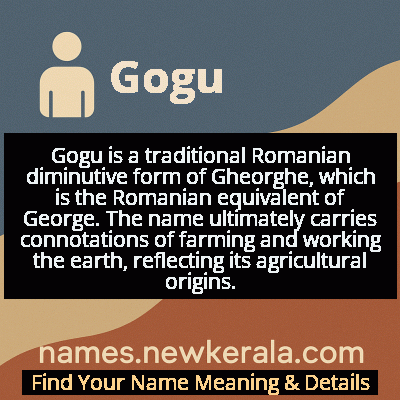Gogu Name Meaning & Details
Origin, Popularity, Numerology Analysis & Name Meaning of Gogu
Discover the origin, meaning, and cultural significance of the name GOGU. Delve into its historical roots and explore the lasting impact it has had on communities and traditions.
Name
Gogu
Gender
Male
Origin
Romanian
Lucky Number
5
Meaning of the Name - Gogu
Gogu is a traditional Romanian diminutive form of Gheorghe, which is the Romanian equivalent of George. The name ultimately carries connotations of farming and working the earth, reflecting its agricultural origins.
Gogu - Complete Numerology Analysis
Your Numerology Number
Based on Pythagorean Numerology System
Ruling Planet
Mercury
Positive Nature
Adventurous, dynamic, curious, and social.
Negative Traits
Restless, impatient, inconsistent, prone to indulgence.
Lucky Colours
Green, white.
Lucky Days
Wednesday.
Lucky Stones
Emerald.
Harmony Numbers
1, 3, 9.
Best Suited Professions
Sales, marketing, travel, entertainment.
What People Like About You
Versatility, charisma, adventurous spirit.
Famous People Named Gogu
Gogu Constantinescu
Engineer and Inventor
Pioneered torsion-based mechanical transmissions and founded the Constantinescu synchronizer company
Gogu Rădulescu
Football Player
Romanian footballer who played as a defender for various Romanian clubs during the 1970s-1980s
Gogu Anghel
Musician
Romanian violinist and composer known for blending traditional Romanian music with contemporary styles
Name Variations & International Equivalents
Click on blue names to explore their detailed meanings. Gray names with will be available soon.
Cultural & Historical Significance
The name also connects to Romania's agricultural heritage, as the original meaning of George relates to farming and working the land. Throughout Romania's history, names like Gogu have served as cultural markers, preserving linguistic patterns and social customs across generations. During the communist era, traditional names like Gogu maintained cultural continuity despite political changes, and in the post-communist period, they've experienced renewed interest as Romanians reconnect with their cultural heritage. The name embodies the resilience of Romanian cultural identity through various historical periods.
Extended Personality Analysis
Individuals named Gogu are typically perceived as having a strong connection to their roots and traditions, often displaying remarkable loyalty to family and community. They tend to be practical, down-to-earth people who value stability and reliability in their relationships and endeavors. There's a natural warmth and approachability to those bearing this name, making them well-suited for roles that require interpersonal connection and trust-building. Their grounded nature doesn't preclude creativity; rather, it provides a stable foundation from which innovative ideas can grow securely.
Gogu is often associated with perseverance and quiet strength - the kind that doesn't need to announce itself but becomes evident in challenging situations. These individuals usually possess a good sense of humor and the ability to find joy in simple pleasures, reflecting the agricultural origins of their name's root meaning. They tend to be excellent problem-solvers who approach difficulties with patience and practical wisdom. While they may not seek the spotlight, their consistent reliability and genuine character often earn them respect and admiration within their social and professional circles. The combination of traditional values and adaptive thinking makes them valuable bridges between different generations and perspectives.
Modern Usage & Popularity
In contemporary Romania, Gogu occupies an interesting position in the naming landscape. While its usage as a primary given name has declined from its mid-20th century popularity, it maintains presence as both a formal name and affectionate nickname for Gheorghe. The name is experiencing a modest revival among parents seeking authentically Romanian names with cultural depth, though it remains far less common than international variants like George. Urban usage is particularly limited, with the name being more frequently encountered in rural areas and among families with strong regional traditions. Modern name statistics show Gogu appearing occasionally in birth registries, often chosen by parents who value its distinctive Romanian character and the connection it provides to cultural heritage. Some contemporary parents opt to use it as a middle name, allowing them to honor family traditions without committing to it as a primary identifier in an increasingly globalized naming environment.
Symbolic & Spiritual Meanings
Symbolically, Gogu represents the profound connection between human identity and the land, embodying the Romanian cultural concept of 'pământ' which encompasses both physical territory and spiritual belonging. The name carries deep metaphorical significance related to growth and cultivation - not merely in agricultural terms but as representations of personal development, community building, and cultural preservation. It symbolizes the quiet strength that comes from being rooted in tradition while remaining adaptable to change, much like resilient agricultural practices that honor ancient wisdom while incorporating modern techniques. The name also embodies the balance between humility and significance, representing individuals who may operate without fanfare but whose contributions are essential to their communities. In a broader sense, Gogu serves as a metaphor for cultural continuity - the idea that identities, like cultivated land, require careful tending across generations to maintain their vitality and meaning.

